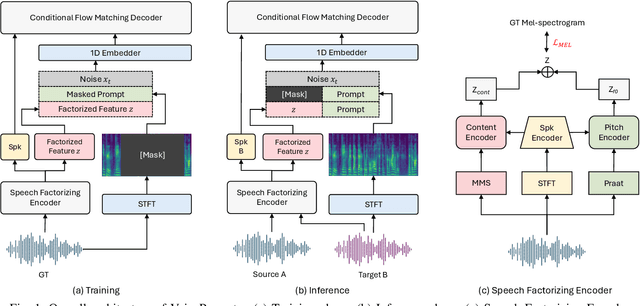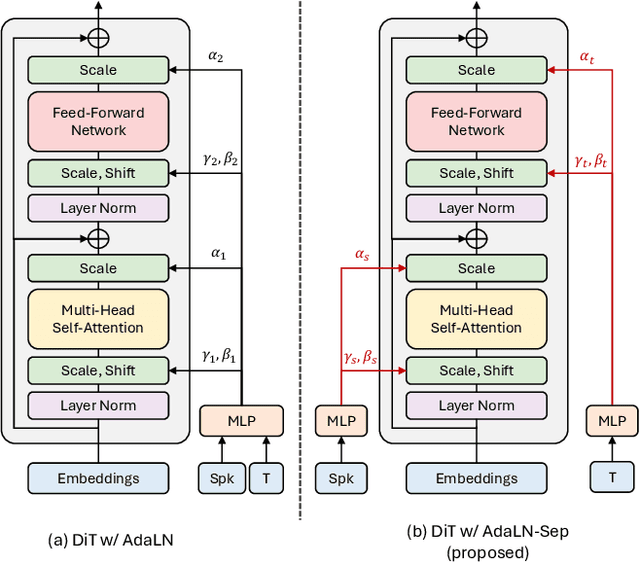Jaehan Park
VoicePrompter: Robust Zero-Shot Voice Conversion with Voice Prompt and Conditional Flow Matching
Jan 29, 2025



Abstract:Despite remarkable advancements in recent voice conversion (VC) systems, enhancing speaker similarity in zero-shot scenarios remains challenging. This challenge arises from the difficulty of generalizing and adapting speaker characteristics in speech within zero-shot environments, which is further complicated by mismatch between the training and inference processes. To address these challenges, we propose VoicePrompter, a robust zero-shot VC model that leverages in-context learning with voice prompts. VoicePrompter is composed of (1) a factorization method that disentangles speech components and (2) a DiT-based conditional flow matching (CFM) decoder that conditions on these factorized features and voice prompts. Additionally, (3) latent mixup is used to enhance in-context learning by combining various speaker features. This approach improves speaker similarity and naturalness in zero-shot VC by applying mixup to latent representations. Experimental results demonstrate that VoicePrompter outperforms existing zero-shot VC systems in terms of speaker similarity, speech intelligibility, and audio quality. Our demo is available at \url{https://hayeong0.github.io/VoicePrompter-demo/}.
LoL-PIM: Long-Context LLM Decoding with Scalable DRAM-PIM System
Dec 28, 2024



Abstract:The expansion of large language models (LLMs) with hundreds of billions of parameters presents significant challenges to computational resources, particularly data movement and memory bandwidth. Long-context LLMs, which process sequences of tens of thousands of tokens, further increase the demand on the memory system as the complexity in attention layers and key-value cache sizes is proportional to the context length. Processing-in-Memory (PIM) maximizes memory bandwidth by moving compute to the data and can address the memory bandwidth challenges; however, PIM is not necessarily scalable to accelerate long-context LLM because of limited per-module memory capacity and the inflexibility of fixed-functional unit PIM architecture and static memory management. In this work, we propose LoL-PIM which is a multi-node PIM architecture that accelerates long context LLM through hardware-software co-design. In particular, we propose how pipeline parallelism can be exploited across a multi-PIM module while a direct PIM access (DPA) controller (or DMA for PIM) is proposed that enables dynamic PIM memory management and results in efficient PIM utilization across a diverse range of context length. We developed an MLIR-based compiler for LoL-PIM extending a commercial PIM-based compiler where the software modifications were implemented and evaluated, while the hardware changes were modeled in the simulator. Our evaluations demonstrate that LoL-PIM significantly improves throughput and reduces latency for long-context LLM inference, outperforming both multi-GPU and GPU-PIM systems (up to 8.54x and 16.0x speedup, respectively), thereby enabling more efficient deployment of LLMs in real-world applications.
 Add to Chrome
Add to Chrome Add to Firefox
Add to Firefox Add to Edge
Add to Edge